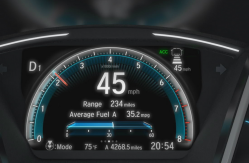
— A "Honda Sensing" lawsuit alleges the driver-assist systems are defective in 2017 Honda CR-V models, including the EX, EX-L and the CR-V Touring.
The proposed class-action lawsuit was filed by lead plaintiffs Kathleen Cadena, Mukeshbhai Patel and Steven Geiger who allege they paid for systems described as “an intelligent suite of safety and driver-assistive technologies designed to alert you to things you might miss while driving.”
Included in the Sensing systems are the following features:
- Collision Mitigation Braking: Applies brake pressure when an unavoidable collision is determined.
- Road Departure Mitigation: Adjusts steering and braking if you cross detected lanes without signaling.
- Adaptive Cruise Control (ACC) with Low-Speed Follow: Maintains a set following interval behind detected vehicles.
- Lane Keeping Assist: Adjusts steering to help you keep centered in a detected lane.
According to the plaintiffs, Honda Sensing is standard equipment on the 2017 CR-Vs, but the technology allegedly makes the SUVs more dangerous due to defects in the software.
Allegedly the systems regularly cause numerous warning messages to intermittently appear, and the CR-Vs fluctuate their highway speeds without warning when adaptive cruise control is set. In addition, drivers are allegedly alerted to hit the brakes immediately although no obstructions are present.
Plaintiff Cadena says her 2017 Honda CR-V Touring suffered those identical problems repeatedly even though the closest vehicle was at least 50 feet ahead. According to the lawsuit, what Cadena experienced is not unique to the Honda Sensing system as numerous owners describe the exact same conditions.
The plaintiffs also argue the CR-Vs are sold with defective millimeter wave radar software that causes intermittent and unexpected failures of the systems.
The plaintiffs say the proof is in a technical service bulletin (TSB 17-064) that told every dealer about problems with the Honda Sensing systems caused by an internal issue with the millimeter wave radar. Dealers were told to update the radar software, but the plaintiffs say the fix fixed nothing.
The lawsuit also alleges in some cases dealers refused to perform the software update or do anything else to correct the problems unless the problems could be replicated.
Some 2017 CR-V owners claim they rented different vehicles because they were afraid to drive the SUVs, leaving those owners wishing they wouldn't have purchased the CR-Vs.
The Honda Sensing lawsuit was filed in the U.S. District Court for the Central District of California - Cadena, et al., v. American Honda Motor Co., Inc.
The plaintiffs are represented by Lemberg Law, LLC.
CarComplaints.com has complaints about the 2017 Honda CR-V and other model years of the CR-V.




